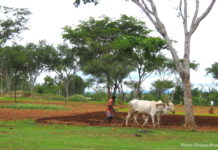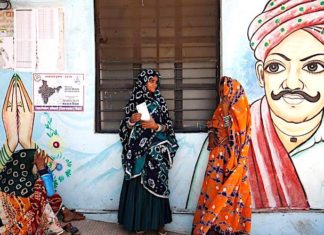Q: You have received threats on several occasions during your career as an activist. Can you describe some of your experiences and how your personal safety is affected by your work?
Of course. They send encrypted messages, even to members of my family. One way to silence a person is to denounce them with the help of corrupt prosecutors and judges. Having been in this fight for more than 20 years, I have received roughly 18 legal complaints and lawsuits.
In some cases, I have been sentenced for defending the water, for example, when I write and publish critical articles on the matter. In this way, Newmont uses judicial power in their favor, especially, to silence those who protest against them.
Q: Do you believe that the recent legal ruling regarding Maxima Acuña Chaupe, a Cajamarcan who won a property rights case against Newmont, will have an impact on future negotiations between residents and mining companies?
No, not at all. This was an isolated case. The corruption of public officials in Cajamarca continues in full force. Undoubtedly, the legal registration of land is in Newmont’s favor and functions with the full complicity of corrupt officials in Cajamarca. There are few official legal protections for private entities, such as Newmont, which was and remains the case with Maxima Chaupe. But this lawsuit is not over yet. Newmont has appealed the ruling and it will continue in Lima.
To give another example, the protection of the 780 lagoons in San Pablo, which has been required by the municipality in Cajamarca since 2003, has yet to be implemented. The judicial powers in Lima have not acted on the matter. This is a clear example of how the influence of Newmont is very strong the courts and proof that the idea of “justice” always leans in favor of the mines.
Q: At the end of your book, you say you would like to write a third book on the Yanacocha mine. What topics would you like to include in Volume III?
Yes, on the protection of Cerro Qullish in 2004 and the vigorous social movements that are defending the last clean water reserves that we have left for the city of Cajamarca. I want to write this story. This was an extraordinary and unique struggle for the people of this world, where for the first time in all the history of the five continents where Newmont operates, the mining company had to back down on its ambitions. There is no other event like it. I will publish this reality very soon.
Q: Finally, where can we buy your book? Also, would like to add any additional comments?
My book is sold exclusively in Cajamarca and is distributed by the National University of Cajamarca.
In closing, I would say the Peruvian state rarely follows its own environmental laws. This is obvious. The state acts like a little brother to transnational corporations, such as Newmont, allowing the big brother to make all the decisions.










